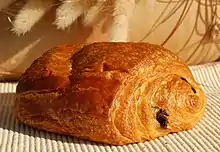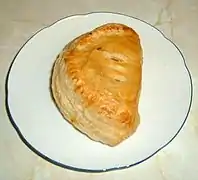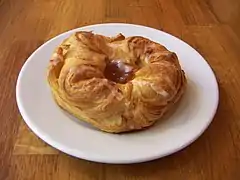Viennoiserie
Viennoiseries (French pronunciation: [vjɛnwazʁi], "things in the style of Vienna") are French baked goods made from a yeast-leavened dough in a manner similar to bread, or from puff pastry, but with added ingredients (particularly eggs, butter, milk, cream and sugar), which give them a richer, sweeter character that approaches that of pastry.[1] The dough is often laminated.
 Pain au chocolat is a type of viennoiserie. | |
| Type | Pastry or bread |
|---|---|
| Course | Breakfast or snack |
| Place of origin | France |
| Main ingredients | Varies by type |
Viennoiseries are typically eaten at breakfast or as snacks.
Types
Examples include croissants; Vienna bread and its French equivalent, pain viennois, often shaped into baguettes; brioche; pain au chocolat; pain au lait; pain aux raisins; chouquettes; Danish pastries; xuixo; bugnes; and chausson aux pommes.
History
The popularity of Viennese-style baked goods in France began with the Boulangerie Viennoise, which was opened by Austrian August Zang in 1839. The first usage of the expression pâtisseries viennoises appeared in 1877 in a book by the French author Alphonse Daudet, Le Nabab.[2] However, the use of puff pastry came later and is a method that is French, not Viennese.[3]
References
- "Viennoiserie". Trésor de la langue française informatisé (in French). ATILF - CNRS & Université de Lorraine. 1994.
- "Viennois, -oise (definition)". Centre National de Ressources Textuelles et Lexicales. Retrieved 19 June 2011.
- Chevallier, Jim; August Zang and the French Croissant: How Viennoiserie Came to France. Chez Jim Books





.jpg.webp)
